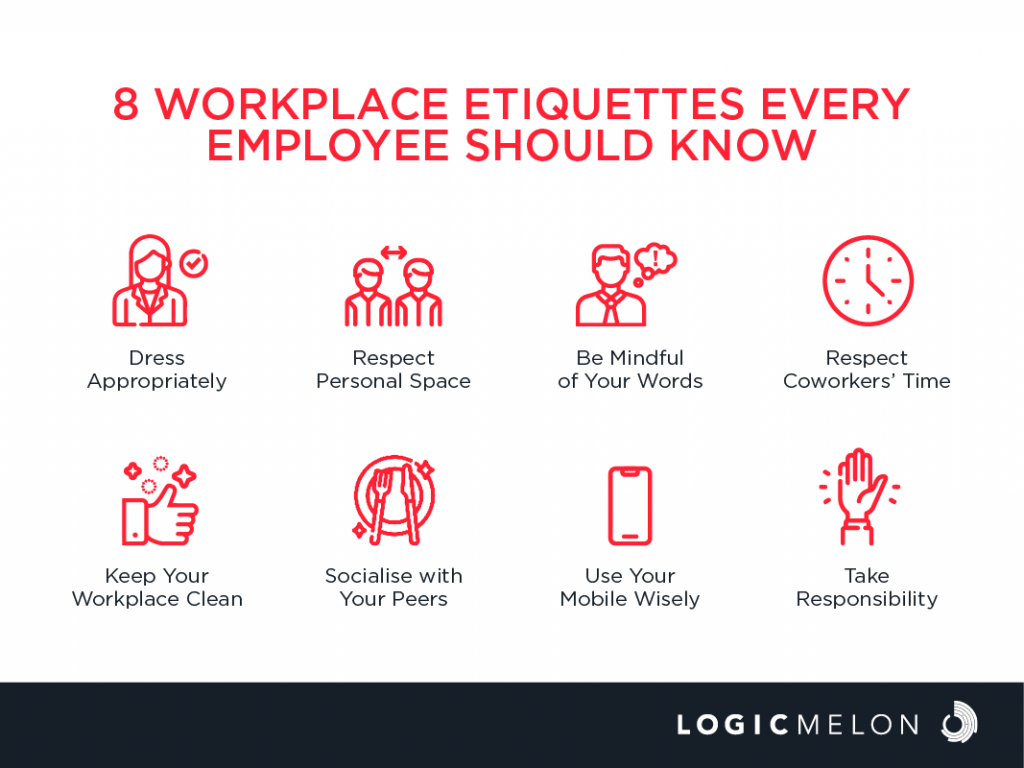8 Workplace Etiquettes Every Employee Should Know
In a work environment, it is common for employees from various cultural backgrounds to work together. When every employee comes together as a team under the same roof, employers expect excellent practices. These workplace etiquettes are necessary to ensure that every employee treats their co-workers respectfully and avoids actions that might make them uncomfortable.
The workplace etiquette may differ for various organisations based on the values they promote and the core values they have established. In such cases, it is better to follow the guidelines laid out by the employers regarding workplace regulations.
With that said, every workplace etiquette is universally based on a standard foundation. These are expected practices from every employee in the organisation. The following are some workplace etiquettes expected from every employee.

1. Dress Appropriately
Regarding workplace attire, it is best to keep things simple. The organisation you are a part of may have a predefined policy for workplace clothing. Contact the human resource team for any queries regarding your outfit.
In instances where you need to meet your clients. You should stick to professional attire that looks clean and neat. This is important since you represent your organisation. Only switch to a casual business outfit if your organisation is okay with it.
2. Respect Personal Space
Every employee works in a different style. Some might like to work with their teammates, while others may like to have their own space to work efficiently. An employee’s productivity depends on the environment the organisation offers them.
In that case, some employees might not be as easygoing and may not move around with everyone right from day one. Some employees may attend meetings and interact with their co-workers for the necessary details, but they may want to keep their distance. Learn to read the room and be mindful of their personal space. Do not go around employees during their leisure time to start a conversation if they don’t feel like talking.
3. Be Mindful of Your Words
Communication is an essential aspect of any business. Daily conversations take place on different levels within the organisation. Conversation between peers, co-workers, and managers might take place on any medium. It can pass through emails or face-to-face communications.
Remember to always be polite when choosing your words. There might be times when an interaction might be harmful. Even in that instance, maintain a civil tone and avoid using rude words to anyone related to your work.
4. Respect Coworkers’ Time
Punctuality is a virtue that every employer expects, even with a company with flexible working hours. An employee who does not adhere to the time can collapse the entire schedule of the day’s meetings. Employees should be mindful of your time.
But more than that, it is essential for you to respect other employees’ time. To do that, arrive at your workplace on time and attend meetings promptly. Also, plan out your project and its tasks. This can help you complete your work on time and before the deadline.
5. Keep Your Workplace Clean
Every employee will have a workplace to perform their daily duties. It is implied that the employee is responsible for the cleanliness of their place. If every employee keeps their place clean, it can have a snowball effect to contribute toward keeping the entire workplace clean.
Tidy up your place regularly, and be sure not to spill anything in your place. It is best to avoid eating snacks at your place as well. A clean environment may encourage other employees to stay motivated and productive.
6. Socialise with Your Peers
Fostering relationships in a workplace is vital for employee engagement. It is important to start conversations with co-workers without invading their personal space.
Everyone in the organisation usually likes to socialise and interact about non-work-related stuff. If a co-worker is friendly toward you, be sure to interact with them without pushing the boundaries. Keep the conversation polite. Try to get together with your co-workers on group events outside of office hours. Events like this help to build a deeper bond between employees.
7. Use Your Mobile Wisely
This is one of the most basic etiquettes that everyone should already be aware of. However, oftentimes, this is the workplace etiquette that most employees forget. Playing with your mobile phone all the time can give the impression that you do not take your tasks seriously and are easy to distract.
Silence your mobile phone during meetings. Even a momentary disturbance can disrupt the natural flow of the meeting. Avoid taking phone calls inside the familiar working premise. This workplace etiquette should be simple and easy to follow.
8. Take Responsibility
In an organisation with different team members, the work progress could encounter various pitfalls. During each challenge the employer faces during the journey, it is hard to pinpoint where the fault lies.
In situations like that, do not play the blame game. Take responsibility for your actions and apologise for any inconvenience you might have caused. Behaving maturely is a must-have workplace etiquette for employees.
Conclusion
The workplace etiquettes mentioned above is something that every employee should follow in their organisation. Following these etiquettes can make the workplace more approachable and a better place for everyone involved in the company. Even small initiatives like this can go a long way to making your employees happy.
LogicMelon
Award-winning recruitment software that will find, attract, hire and analyse the way you want to work. At LogicMelon, we have experienced software recruitment marketing specialists to help you build effective recruitment solutions supported by the best customer service you’ll find anywhere!
Email: [email protected] or call LogicMelon (UK) +44 (0) 203 553 3667 (USA) +1 860 269 3089
Cognitive Ability Tests in Recruitment
Cognitive ability tests are used in the recruitment process to evaluate a candidate’s intellectual capabilities, problem-solving skills, and aptitude.
Benefits and Challenges of Outsourcing Recruitment
It is essential for organisations to carefully weigh the pros and cons and choose a outsourcing recruitment partner that aligns with specific needs and objectives.
The Psychology of Decision-making in Hiring
Hiring decisions are more than just the sum of a candidate’s qualifications and experience; they are influenced by decision-making.


